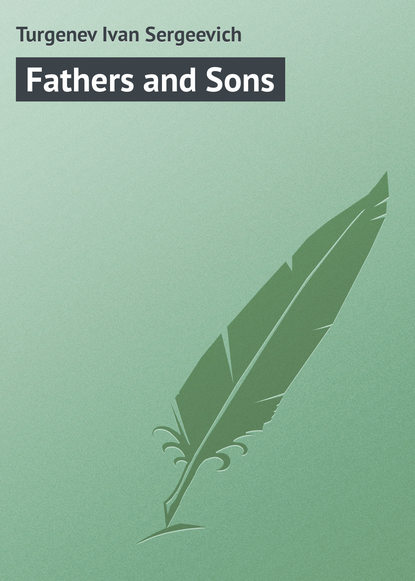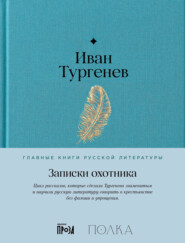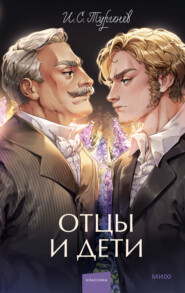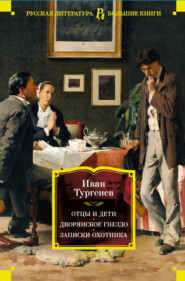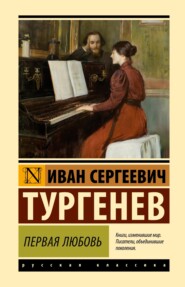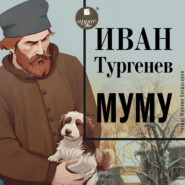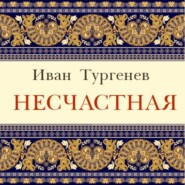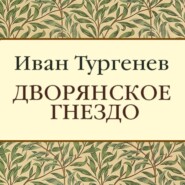По всем вопросам обращайтесь на: info@litportal.ru
(©) 2003-2024.
✖
Fathers and Sons
Настройки чтения
Размер шрифта
Высота строк
Поля
Bazarov scratched his head.
"Something else I could say, Arkady," he replied. "But I will not say that something – it would savour too much of Romanticism. Get married as soon as you can, line your nest, and beget plenty of offspring. Nor will those offspring be altogether fools, seeing that they will be born in due season, and not when you and I were… My horses are ready and I must depart. Of the rest of the household I have taken leave already. Shall we embrace once more, eh?"
The tears gushed in torrents from Arkady's eyes as he flung himself upon his old friend and mentor.
"Ah, youth, youth!" commented Bazarov. "See what comes of being young! But before long, I know, Katerina Sergievna will have set things right. Yes, she will console you."
With a last good-bye he mounted the travelling cart, and, in the act of doing so, pointed to a pair of jackdaws which were sitting perched upon the stable roof.
"See!" he cried. "There's an instructive lesson for you!"
"What do you mean?" queried Arkady.
"What?" was Bazarov's ejaculation. "Are you so ignorant of, or so forgetful of, natural history as not to know that the jackdaw is the most respected of family birds? Mark the good example before you. Farewell, señor!"
And with a clatter the cart started on its way.
Nor was Bazarov mistaken, for, even before nightfall, Arkady, deep in conversation with Katia, had completely forgotten his vanished instructor. Moreover, already the young fellow was beginning to play second fiddle to his fiancée: which circumstance the girl, on realising, in no way felt surprised at. So it was arranged that on the following day he should depart for Marino to interview his father; and in the meanwhile, Anna Sergievna, having no desire to hamper the young couple, merely observed such a show of propriety as involved her not leaving them together for long, but at the same time keeping at a distance the Princess, who, since the tidings of the impending union, had been in a state of lachrymose rancour. For herself, Anna Sergievna had at first feared that the spectacle of the young people's happiness would prove too much for her; but now the contrary proved to be the case, and she not only failed to feel hurt at the spectacle, but even found that it interested her and eventually softened her – a consummation which brought both relief and regret.
"Bazarov was right," she reflected. "It was mere curiosity, mere love of ease, mere egoism, mere – "
"Children, is love an empirical sentiment?" once she asked of Arkady and Katia: but neither of the pair understood her meaning. Moreover, they were fighting a little shy of her, since they could not altogether forget the conversation which they had involuntarily overheard; but in time Anna Sergievna succeeded in overcoming also this timidity, and found the task the more easy to perform in that she had succeeded also in overcoming her disappointment.
XXVII
The old Bazarovs' delight at their son's return was the greater in that the event was so unexpected. To such an extent did Anna Vlasievna fuss and flounce about the house that Vasili Ivanitch likened her to a hen partridge (no doubt the short tail of her blouse did impart to her rather a bird-like aspect); while, as regards Vasili himself, he grunted, and sucked the amber mouthpiece of his pipe, and, grasping the shank, inverted the bowl as though to make sure that it was secure, and, finally, parted his capacious lips, and gave vent to a noiseless chuckle.
"I am going to spend with you six whole weeks," said Bazarov. "But I desire to work, and therefore must not be disturbed."
"Before we will disturb you, you shall forget what my face looks like," replied Vasili Ivanitch.
And he kept his word; for, after allotting his son the study, he not only remained completely out of sight, but even prevented his wife from manifesting the least sign of tenderness.
"When Evgenii last visited us," he said to her, "you and I proved a little wearisome; so this time we must be more discreet."
Anna Vlasievna agreed, much as she lost by the arrangement, seeing that now she beheld her son only at meal times, and feared, even then, to speak to him.
"Eniushenka," she would begin – then, before he had had time to raise his eyes, pluck nervously at the strings of her cap, and whisper: "Oh no; it was nothing," and address herself, instead, to Vasili Ivanitch; saying, for instance (with cheek on hand as usual): "My dear, which would our darling Eniusha prefer for dinner – cabbage soup or beef with horse-radish?" And when Vasili Ivanitch would reply: "Why should you not ask him yourself?" she would exclaim: "Oh no, for that might vex him."
But eventually Bazarov ceased to closet himself, in that there came an abatement of the work fever, and to it succeeded fits of depression, ennui, and an inordinate restlessness. In his every movement there began to loom a strange discontent, from his gait there disappeared its old firm, active self-confidence, and, ceasing to indulge in solitary rambles, he took to cultivating society, to attending tea in the drawing-room, to pacing the kitchen garden, and to joining Vasili Ivanitch in a silent smoking of pipes. Nay, on one occasion he even paid Father Alexis a visit!
At first the new order of things rejoiced Vasili Ivanitch's heart: but that joy proved short-lived.
"Though I could not say why, Eniusha makes me anxious," he confided to his spouse. "Not that he is discontented or ill-tempered – such things would not have mattered: rather, it is that he is sad and brooding, and never opens his lips. Would that he would curse you and me, for instance! Also, he is thinner; nor do I like the colour of his face."
"O God!" whispered the old woman. "Yet I may not even put my arms around his neck!"
From that time onwards Vasili Ivanitch began to make cautious attempts to question Bazarov concerning his work, his health, and his friend Arkady; but always Bazarov returned reluctant, indifferent replies, and once, when his father was for introducing the foregoing topics, said irritably:
"Why are you for ever tiptoeing around me? Your present manner is even worse than your former one."
"There, there – I did not mean anything," was poor Vasili Ivanitch's reply.
Political allusions proved equally fruitless. For instance, when Vasili Ivanitch was seeking to engage his son's interest on the score of the impending emancipation of the serfs and progress in general, the other muttered carelessly:
"Yesterday, when passing through the courtyard, I heard some peasant lads singing, not one of the good old songs, but I The age of truth is coming in, when hearts shall glow with love.' There's progress for you!"
Occasionally Bazarov would repair to the village, and, in his usual bantering fashion, enter into conversation with some peasant.
"Well," he said to a muzhik, "pray expound to me your views on life. For they tell me that in you lie the whole strength and the whole future of Russia – that you are going to begin a new epoch in our history, and to give us both a real language and new laws."
The peasant made no reply at the moment. Then he said:
"We might do all that if first we had a new chapel here."
"Tell me something, though, about the world in general," Bazarov interrupted. "The world stands on three fishes, does it not?"
"It does that, batiushka," the peasant replied with the quiet, good-humoured sweetness of the patriarchal age. "But above it stands the will of the masters. The baré are our fathers, and the harder the barin drives, the better for the muzhik."
Shrugging his shoulders contemptuously at this statement, Bazarov turned away, while the peasant slunk off homewards.
"What did he say?" asked a sullen-looking, middle-aged peasant who had been standing at the door of his hut during the course of the foregoing colloquy. "Was he talking of arrears of taxes?"
"Of arrears of taxes!" retorted the first peasant, his tone now containing not a trace of its late patriarchal sweetness, but, rather, a note of purely dry contempt. "He was chattering just for chattering's sake – he likes to hear his own tongue wag. Do not all of us know what a barin and the likes of him are good for?"
"Aye," agreed the second peasant; whereafter, with much nodding of caps and gesticulating of fists, they fell to discussing their own affairs and requirements. So alas for Bazarov's scornful shrug of the shoulders! And alas for that knowledge of the way in which the peasant should be talked to whereof the young Nihilist had made such boast when disputing with Paul Petrovitch! In fact, never had it dawned upon the mind of the self-confident Bazarov that, in the eyes of the muzhik, he was no better than a pease-pudding.
However, he succeeded in discovering for himself an occupation. This was when, in bandaging a peasant's leg, Vasili Ivanitch's hands shook a little through senility, and his son hastened to his assistance: and from that time forth Bazarov acted as Vasili Ivanitch's partner, even though he maintained unabated his ridicule both of the remedies which he himself advised and of the father who hastened to put them into practice. Yet in no way did his son's raillery annoy Vasili Ivanitch: rather, it heartened the old man. Smoking his pipe, and drawing his dirty overall in to his waist with both thumbs, he would listen delightedly to the scoffer, and chuckle, and show his blackened teeth the more in proportion as the sallies contained a greater measure of venom. Nay, stupid or simply senseless as many of these witticisms were, he would frequently catch them up, and repeat them. To take one instance, he, for several days in succession, kept assuring every one in the village and in the town that "we call this the nine o'clock office" – the sole basis being the fact that once, on learning of his (Vasili Ivanitch's) habit of attending Matins, Bazarov had made use of the phrase in question.
"Thank God, Evgenii has ceased to mope," he confided in a whisper to his wife. "In fact, you should have heard him rating me to-day!"
Also, the thought that he had such an assistant in his labours filled the old man with pride.
"Yes, yes," he would say as he handed some peasant woman in a man's jacket a phial of medicinal water or a pot of cold cream, "you ought daily to thank God that my son happens to be staying with me, since otherwise you could not possibly have been treated according to the latest and most scientific methods. Do you understand? I say that even Napoleon, the Emperor of the French, has not at his disposal a better physician than my son."
And the peasant woman (who had come, it may be, to complain of "a lifting with the gripes" – an expression which probably she herself could not have explained) would bow, then proffer the three or four eggs which would be tied up in a corner of her neckcloth.
Also, when Bazarov extracted a tooth from the jaw of a travelling pedlar, Vasili Ivanitch could not allow even the very ordinary character of the tooth to prevent him from preserving it as a rarity, and showing it to Father Alexis.
"See what a fang!" he said. "And to think of the strength which Evgenii must possess! He lifted the pedlar clean from the ground! It was like uprooting an oak tree!"
"Splendid!" was Father Alexis' comment – he knew not what else to say, nor, for that matter, how else to get rid of the enthusiastic veteran.
Lastly, there was an occasion when a peasant from a neighbouring village brought his brother to be treated. Suffering from typhus, the patient was lying face downwards on the straw in the cart, and had reached the last stage, since already his body was covered with spots of a hectic nature, and he had long lost consciousness. To an expression of regret that resort had not sooner been had to medical aid, Vasili Ivanitch could add no more than an intimation that no hope was left: nor was he wrong, seeing that even before the peasant succeeded in conveying his brother back to the village, the sick man had breathed his last.
Three days later Bazarov entered his father's room with an inquiry for some hell-stone.
"I have some," said Vasili Ivanitch; "but what do you want it for?"





